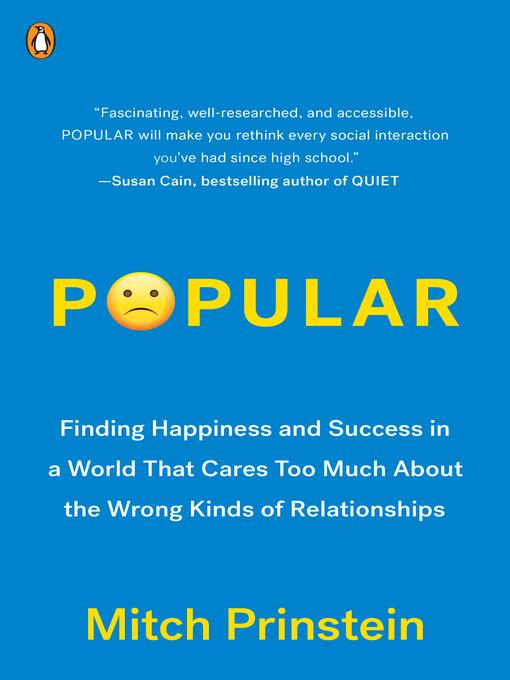
Popular
Finding Happiness and Success in a World That Cares Too Much About the Wrong Kinds of Relationships
کتاب های مرتبط
- اطلاعات
- نقد و بررسی
- دیدگاه کاربران
نقد و بررسی

For those who wish they sat at the popular kids' table back in the day comes this intriguing treatise on how popularity works, sometimes for good, sometimes for ill.It's a tragic fact that life often recapitulates high school, that one's place in the pecking order seldom changes, whether playground meat or prom king. Prinstein (Clinical Psychology/Univ. of North Carolina), a self-described "psychology nerd," observes that the course of one's popularity through life is firmly established way back in first grade. However, he notes repeatedly, there are two kinds of popularity: one is an indicator of status and thus highly variable, while the other is likability, which "captures those we feel close to and trust, and the people who make us happy when we spend time with them." Confusing the two categories, by Prinstein's account, is a good way to make oneself unhappy, as with one popular girl who, invited to all the right parties, began to ingest everything on hand at those festivities, earning herself an alcohol dependency. As the author writes, there are actual physiological reasons for seeking status, things that happen in the ventral striatum that reward us for success in the brain's "emotional salience" network. Unfairly, the popular kids often live longer than the unpopular ones, perhaps as a consequence of the latter's being "isolated, disconnected, lonely" and made mean by "hostile attribution bias," the tendency to blame our problems on others. Prinstein closes his discussion with an enumeration of the qualities of likability, including self-reflection, taking turns in conversation and other activities rather than dominating them, and not disrupting the group in naked self-interest. A word for the downtrodden: the author suggests that the better kind of popularity is not necessarily inborn--i.e., people can change their own luck by cultivating these and other qualities. Though repetitive, an eye-opening look at the ways of the world--at least the world as the cool kids know it. COPYRIGHT(1) Kirkus Reviews, ALL RIGHTS RESERVED.

Starred review from June 1, 2017
Prinstein (psychology & director of clinical psychology, Univ. of North Carolina at Chapel Hill) aims to understand popularity; to reconsider our society's obsession with status; and to show how our desire for social approval can influence our choices. Many of us seem to never escape our high school perception of ourselves as popular or unpopular. To understand why, the author goes back to our prehistoric ancestors. He examines how the ventral striatum in our brains begins to change during puberty and is activated by social rewards stimulated by the neurochemicals oxytocin and dopamine. Prinstein's research reveals two different types of popularity: status and likability. Likeable people actually are better at their jobs, happier, and more fulfilled; however, the modern world tends to focus on status, as shown by the emphasis on how many "likes" you can get on Facebook. Prinstein concludes by talking about the role of parents in trying to help their children become popular. As does Martin E.P. Seligman in Authentic Happiness, the author differentiates between what we think will make us happy and what actually does. VERDICT This highly readable study, which successfully blends science and anecdotes, is strongly recommended for public libraries.--Elizabeth Safford, Boxford Town Lib., MA
Copyright 2017 Library Journal, LLC Used with permission.

























دیدگاه کاربران